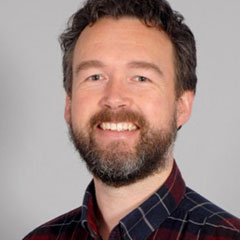Philip Garnett, Professor of Systems and Organisation, Institute for Safe Autonomy and School for Business and Society
Philip is a Professor in Systems and Organisation. His research focuses on the application of systems theory, complex systems theory, and network analysis to understand organisations and how they operate.

He is also the Society and Ethics Pillar lead at the Institute for Safe Autonomy, and he's interested in how algorithms, machine learning, and artificial intelligence, influence decision making within organisations.
email: philip.garnett@york.ac.uk
Our 60-second interview with Philip:
Could you please tell us what work you do in the field of mental health?
I am interested in the role of autonomous systems in health care in general. This could be things like AI decision support tools, chat bots, self help bots and apps etc. I was Co-I on a Welcome Trust funded project that looked specifically at the use of mental health apps in higher education, and the network of interests and organisations that surrounded those apps.
What do you find most rewarding and inspiring in this work?
There are potentially beneficial uses of AI and autonomous systems in health care. For example, more efficient allocation of resources, directing people to the correct services, or support systems for medical health professionals that allow them to do their work more effectively.
What is the most challenging or complicated aspect of this work?
As with most things, there are challenges with applying AI and autonomous systems in any settings. Such as, how do you trust that the system is fair and doing what it was intended to do, has the possibility of discrimination and bias been minimised? There are also vested interests in the the deployment digital systems, and we need to make sure their implementation and deployment is to the benefit of society.
What impact do you hope your work is having - or can potentially have?
Improve the development, implementation, and deployment of digital systems in the health care space, particularly systems that have use machine learning or AI, or are autonomous systems.
Could you share with us one piece of advice that you follow for your own mental health?
I try to ensure that I maintain a good work life balance, which is a challenge for all academics (particularly those earlier in their career). However, being able to take time away from work where possible is important for mental health, even if it is something like going for a walk.